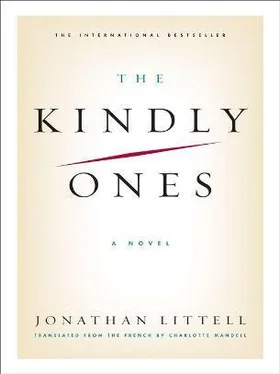The trip unfurled like a film, I didn’t think; the methods of transportation followed one another, I held out my tickets when I was asked, the authorities didn’t make any problems for me. When I left the house, on the path to town, the sun now fully risen over the gently booming sea, I met an Italian patrol that glanced curiously at my uniform, but didn’t say anything; just before getting into the bus, a French policeman accompanied by two bersaglieri accosted me to ask for my papers: when I showed him the letter from the Einsatzkommando in Marseille and translated it for him, he saluted and let me go. It was better that way, I would have been incapable of talking, I was petrified with anguish, my thoughts were frozen in place. In the bus, I realized I had forgotten my suit and all my clothes from the day before. At the train station in Marseille I had to wait for an hour, so I ordered a coffee and drank it at the bar, in the hubbub of the main concourse. I had to try to reason things out a little. There must have been cries, noise; how could I not have been awakened? I had only drunk a glass of wine. And also the man hadn’t killed the twins, they must have yelled. Why hadn’t they come looking for me? What were they doing there, silent, when I had woken up? The murderer must not have searched the house, in any case he hadn’t come into my room. And who was he? A bandit, a thief? But nothing seemed to have been touched, moved, overturned. Maybe the twins had surprised him and he had run away. But that didn’t make any sense, they hadn’t cried out, they hadn’t come looking for me. Was the killer alone? My train was leaving, I got in and sat down, still reasoning. If he wasn’t a thief, or thieves, then what? A settling of accounts? One of Moreau’s business deals gone sour? Terrorists from the Maquis, come to set an example? But the terrorists didn’t massacre people with axes like savages, they took them into a forest for a show trial, then shot them. And, again, I hadn’t woken up, I who sleep so lightly, I didn’t understand, anguish was racking my body, I sucked my half-healed fingers, my thoughts flew round and round, set off on insane tangents, caught in the jerking rhythm of the train, I wasn’t sure of anything, nothing made sense. In Paris, I easily caught the midnight express to Berlin; when I arrived, I took a room in the same hotel. Everything was calm, silent, a few cars went by; the elephants, which I still hadn’t gone to see, were trumpeting in the early morning light. I had slept a few hours in the train, a black, dreamless sleep; I was still exhausted, but it was impossible to go back to sleep. My sister, I said to myself finally, I have to let Una know. I went to the Kaiserhof: Had Freiherr von Üxküll left an address? “We cannot give out the addresses of our clients, Herr Sturmbannführer” was the reply. But could they at least send a telegram? It was a family emergency. Yes, that was possible. I asked for a form and wrote it on the reception counter: MOTHER DEAD MURDERED STOP MOREAU TOO STOP AM IN BERLIN CALL ME STOP, followed by the number of the Eden Hotel. I handed it to the receptionist with a tenreichsmark bill; he read it gravely and said, bowing his head slightly: “My condolences, Herr Sturmbannführer.”—“You’ll send it right away?”—“I’m calling the post office this instant, Herr Sturmbannführer.” He gave me the change and I went back to the Eden, leaving instructions for someone to come get me immediately in case of a phone call, whatever the time. I had to wait till nightfall. I took the call in a booth next to the reception, fortunately isolated. Una’s voice was panicked: “What happened?” I could hear that she had been crying. I began as calmly as possible: “I was in Antibes, I went to visit them. Yesterday morning…” My voice faltered. I cleared my throat and went on: “Yesterday morning I woke up…” My voice broke and I couldn’t go on. I heard my sister calling: “What is it? What happened?”—“Wait,” I said harshly and lowered the receiver to my thigh while I tried to get control of myself. This had never happened to me, losing control of my voice like this; even at the worst moments, I had always been able to explain things in an orderly, precise way. I coughed, coughed again, then brought the receiver back to face level and explained to her in a few words what had happened. She had only one question, frantic, panic-stricken: “And the twins? Where are the twins?” And then I went mad, started thrashing about in the phonebooth, hitting the walls with my back, my fist, my foot, shouting into the receiver: “Who are those twins?! Those fucking brats, whose are they?” A bellboy, alerted by the racket, had stopped in front of the booth and was looking at me through the glass. I calmed down with an effort. My sister, at the other end, remained silent. I took a breath and said into the receiver: “They’re alive. I don’t know where they went.” She didn’t say anything, I thought I could hear her breathing through the crackle of the international line. “Are you there?” No answer. “Whose are they?” I asked again, gently. She still didn’t speak. “Fuck!” I shouted, and hung up abruptly. I burst out of the booth and stood in front of the reception desk. I took out my address book, found a number, scribbled it on a piece of paper and handed it to the concierge. After a few minutes the telephone rang in the booth. I picked up the receiver and heard a woman’s voice. “Good evening,” I said. “I would like to speak with Dr. Mandelbrod. It’s Sturmbannführer Aue.”—“I’m sorry, Herr Sturmbannführer. Dr. Mandelbrod is not available. Can I take a message?”—“I would like to see him.” I left the hotel’s number and went back up to my room. An hour later a bellboy came with a note for me: Dr. Mandelbrod would receive me the next day, at 10:00 a.m. The same women, or ones who looked just like them, led me in. In the large light-filled office, with cats everywhere, Mandelbrod was waiting in front of the low table; Herr Leland, upright and thin in a pinstriped suit, was sitting next to him. I shook their hands and sat down. This time they didn’t serve me tea. Mandelbrod spoke first: “I’m delighted to see you. Have you had a good leave?” He seemed to be smiling into his folds of fat. “Have you had time to think about my proposal?”—“Yes, Herr Doktor. But I would like something else. I would like to be transferred to the Waffen-SS to go to the front.” Mandelbrod made a slight movement, as if he were shrugging his shoulders. Leland was staring at me with a harsh, cold, lucid gaze. I knew he had a glass eye, but could never tell which. It was he who answered, in a gravelly voice with a minute trace of an accent: “That is impossible. We have seen your medical file: your wound is regarded as a serious disability, and you have been classified for office work.” I looked at him and stammered: “But they need men. They’re recruiting everywhere.”—“Yes,” Mandelbrod said, “but they’re not taking just anyone. Rules are rules.”—“They’ll never take you back for active service,” Leland hammered out.—“Yes,” Mandelbrod went on, “and for France there’s not much hope, either. No, you should put your trust in us.” I got up: “Meine Herren, thank you for having me. I’m sorry I disturbed you.”—“But there’s no problem, my boy,” Mandelbrod whispered. “Take your time, think some more.”—“But remember,” Leland added severely: “a soldier at the front cannot choose his place. He must do his duty, whatever his post.”
From the hotel, I sent a telegram to Werner Best in Denmark, telling him I was ready to accept a position in his administration. Then I waited. My sister didn’t call back, and I didn’t try to contact her, either. Three days later they brought me a letter from the Auswärtiges Amt ; it was Best’s reply: the situation in Denmark had changed, and he had nothing to offer me for the moment. I crumpled the letter up and threw it out. Bitterness and fear were welling up; I had to do something to avoid collapsing. I called back Mandelbrod’s office and left a message.
Читать дальше










